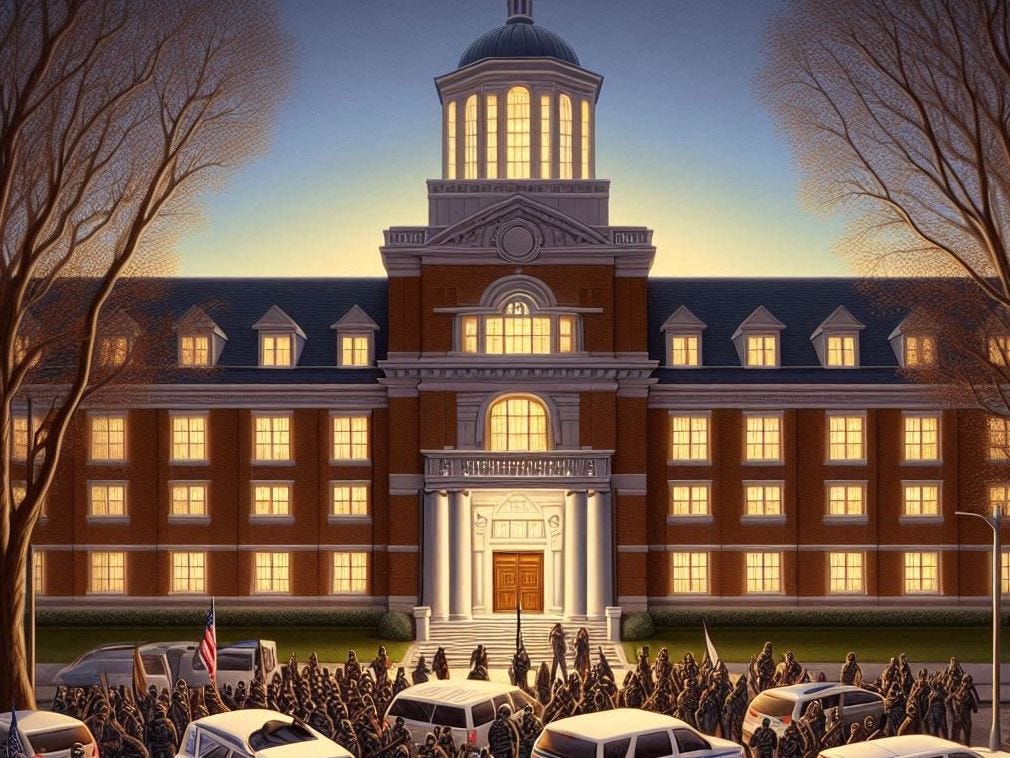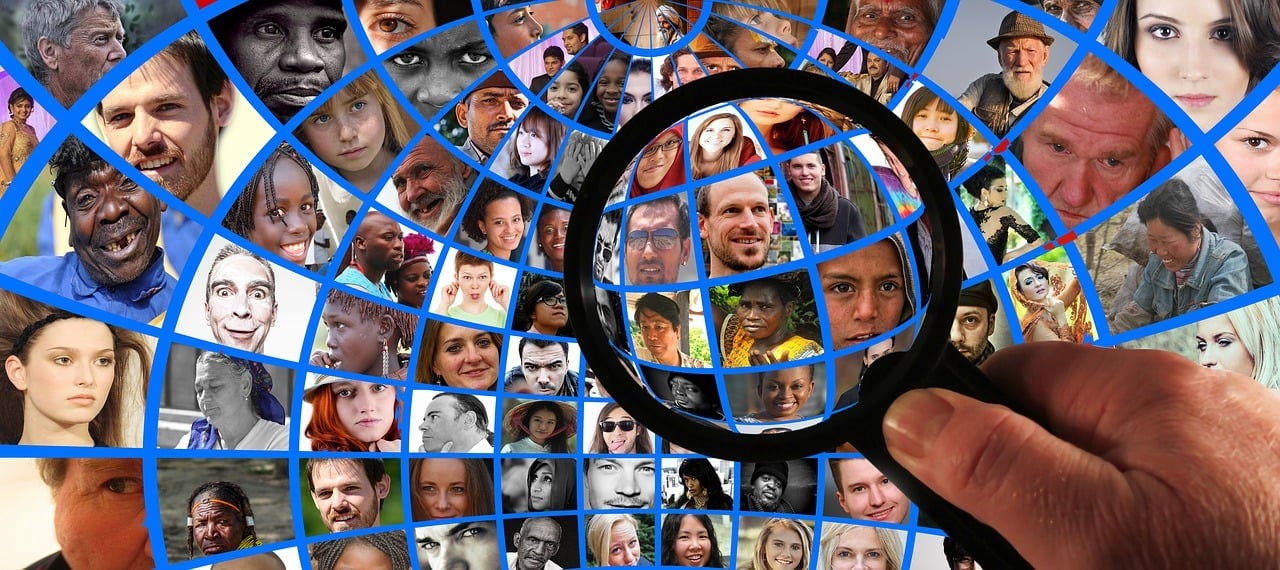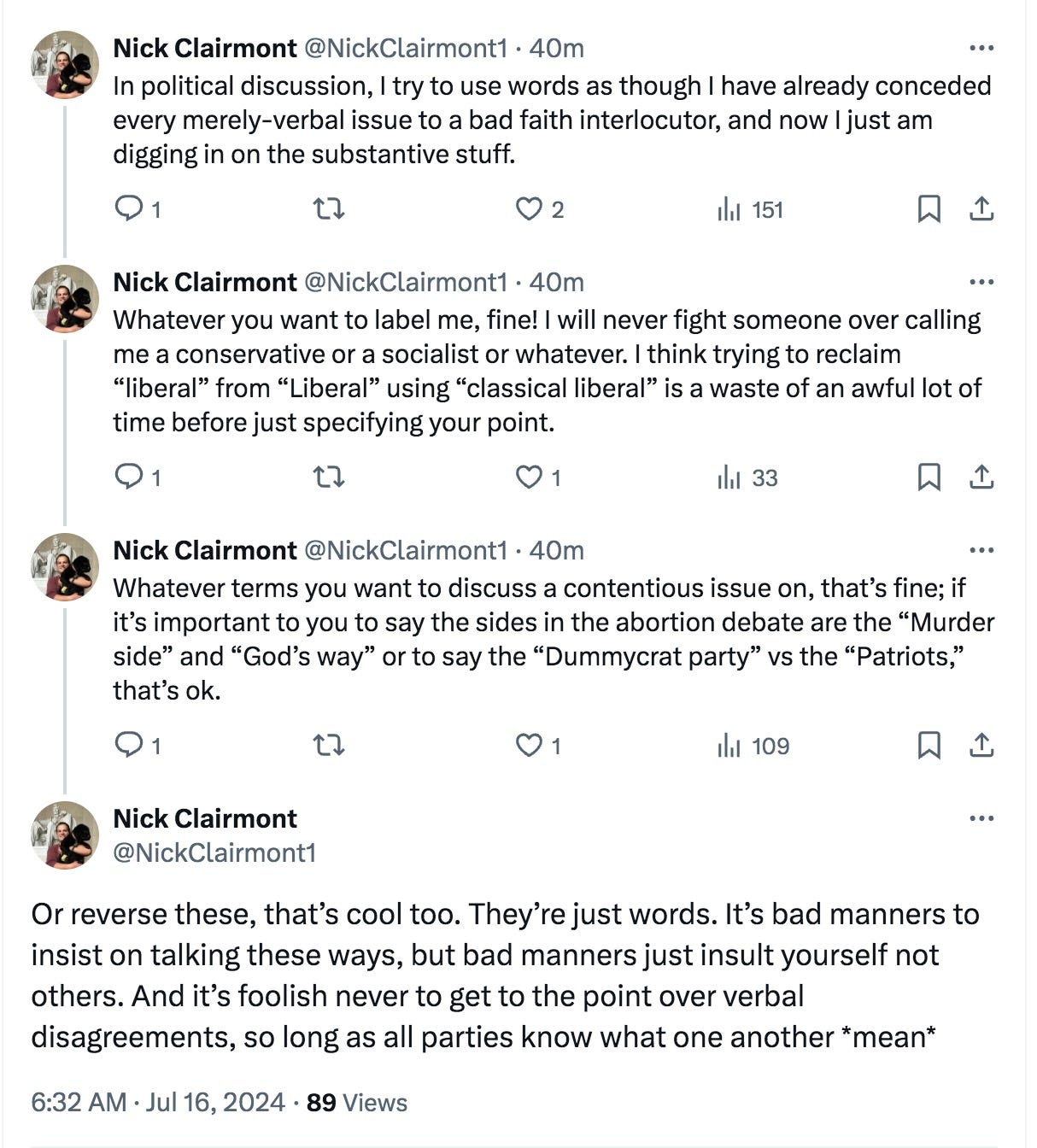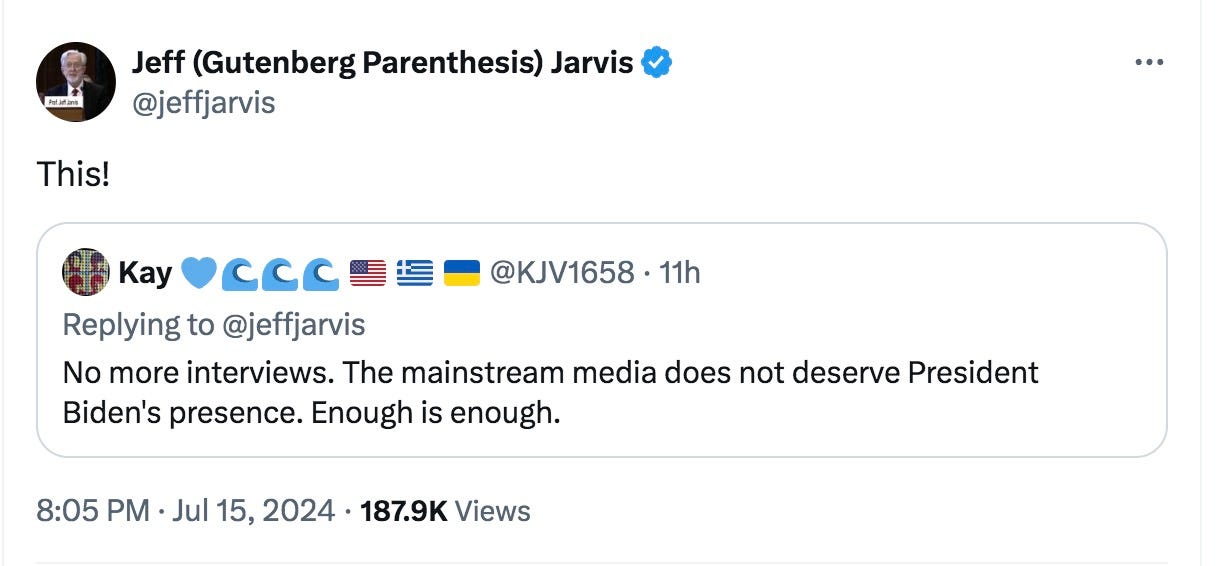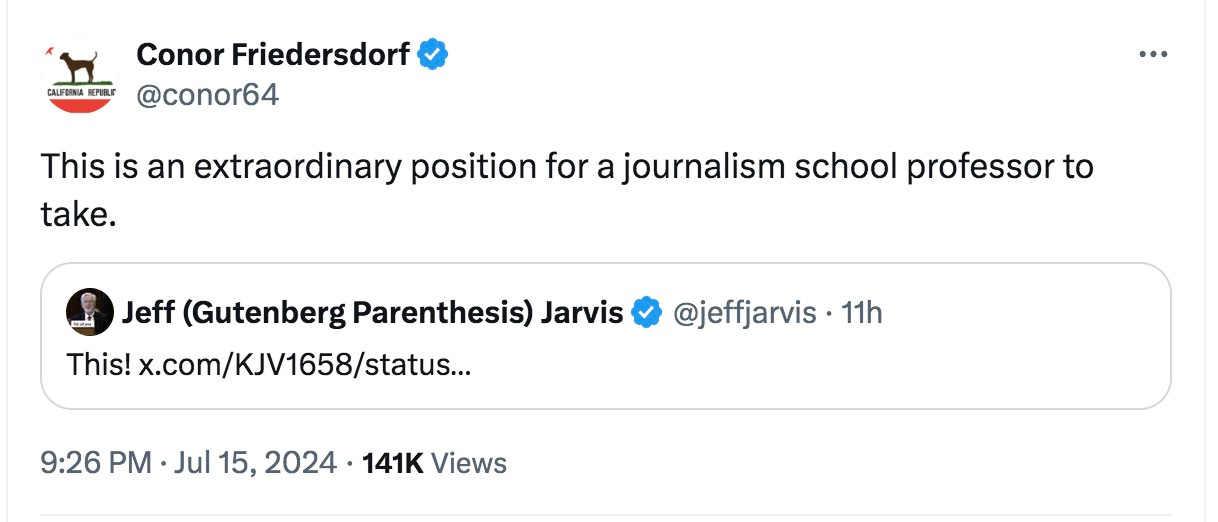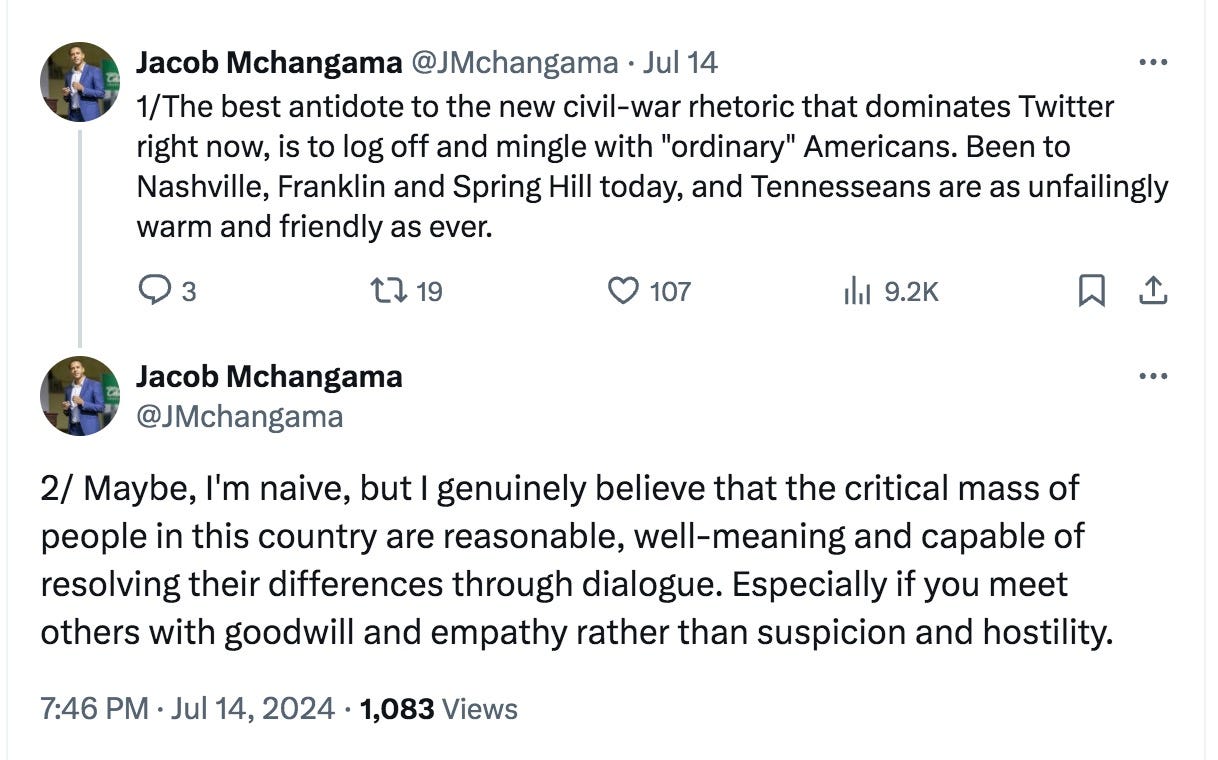E-Pluribus | July 16, 2024
Not everything is a federal case; rejecting escalation; and the sorry state of sociology.
A round-up of the latest and best musings on the rise of illiberalism in the public discourse:
J.D. Tuccille: Federal Intervention in Campus Protests Is Going Too Far
Maintaining safety and order on campus is certainly in the best interests of students and school personnel, but how far should they go in attempting to secure safety and order? Writing for Reason, J.D. Tuccille explains the position as articulated by the Foundation for Individual Rights and Expression, that involving the federal government is simply a bridge too far.
"The Department of Education is required by law to guard against discrimination on the basis of race, color, or national origin in higher education," the Foundation for Individual Rights and Expression (FIRE) noted last week. "Now the agency is telling college and university administrators they can only achieve this important goal by violating the First Amendment."
FIRE points to agreements between the Department of Education's Office for Civil Rights (OCR) and the University of Michigan, the City University of New York, and Lafayette College, which were under investigation for their handling of campus protests in the wake of Hamas's October 7 attack on Israel. The agreements indicate official dissatisfaction with how the schools managed responses to the protests and require stronger action in the future.
"OCR found no evidence that the university complied with its Title VI requirements to assess whether incidents individually or cumulatively created a hostile environment for students, faculty, or staff, and if so, to take steps reasonably calculated to end the hostile environment, remedy its effects, and prevent its recurrence," reads the agreement with the University of Michigan.
FIRE objects that federal bureaucrats seem to want the university to treat expression by students, whether or not it's coordinated, as contributing towards some critical mass of bad vibes. Once an invisible line of cumulative nasty statements is crossed and a hostile environment considered to exist, the document suggests that official intervention becomes necessary.
[. . .]
Overt harassment and acts of violence are not protected. Firebombings and assaults are fair game for police attention. That's true no matter the political positions of those who are guilty.
But requiring "climate assessments" of schools to determine if campus discourse has passed some invisible hostility threshold that necessitates official intervention goes too far. Any such assessment will inevitably be subjective and tend towards the restrictive side as administrators fear drawing the wrath of federal bureaucrats and the financial sticks they wield as potential penalties.
The truth is that government officials have a terrible track record when it comes to monitoring speech and protests. That was true in the 1970s when the Church Committee found the FBI "has placed more emphasis on domestic dissent than on organized crime" and it was true more recently when the feds fingered Revolutionary War imagery as indicative of violent extremism.
Few areas of life are improved by government intervention, and political debate is not an exception. Government action risks turning protesters who might be rightly called out by peers for bad causes and hideous statements into martyrs joining the ranks of dissidents surveilled by the state.
Read it all.
William A. Galston: A Chance to Reject Political Violence
More than four decades since the attempt on Ronald Reagan’s life, America is coping once again with the strong emotions and upheaval that inevitably accompany such traumatic events. At the Wall Street Journal, William Galston says everyone from the top down has the opportunity and responsibility to reject further violence, and Trump himself has a chance to set the tone.
“Turning points” usually aren’t. After each school shooting, horrified Americans insist that things can’t go on this way. But within days the demands for change subside. Will the attempted assassination of former president Donald Trump be different?
Since the frightening scene that unfolded Saturday evening in Butler, Pa., members of both political parties have urged their leaders to pause, take a collective deep breath and de-escalate the vehement rhetoric. They’ve asked partisans to remember that the other side’s members are opponents, not enemies, and that pointing the finger of blame isn’t helpful.
President Biden, in remarks from the White House Sunday afternoon, responded as a human being, not as a candidate in a hotly contested election. He condemned political violence, starting with the attempt on Mr. Trump’s life. He also said he talked to his opponent and is keeping him in his prayers. Speaking from the Oval Office later on Sunday, Mr. Biden pleaded for the peaceful resolution of our differences through democratic means.
[. . .]
Mr. Trump’s acceptance speech will be the convention’s pivotal moment. Pundits are comparing his conduct in the moments after the shooting to former President Theodore Roosevelt’s after he was shot while campaigning in Milwaukee (by chance, the site of this year’s convention). Mr. Trump’s raised arm and fist pumps will influence how history remembers him.
Mr. Trump now has an opportunity to transmute strength into magnanimity. He can tell his followers that a successful second term will be the “retribution” that he promised them. They’ve persecuted me, he can say, and you’re right to be angry. But responding in kind won’t build the country we all want. Let’s give the country an example of true patriotism. If we do, we’ll win in a landslide and have the best chance ever to make America great again.
Let’s focus on the future, not the past. The party platform you’ve endorsed is what our party wants and what I will do. Here are some of the promises we make to the American people: We’ll seal the border and stop the migrant invasion. We’ll stop outsourcing and turn the U.S. into a manufacturing superpower. We’ll protect Social Security and Medicare. I ask you: Is this an agenda for ending democracy in America, or is it common sense? You the people will judge, and I have full confidence in your verdict.
Read it all here.
Alexander Riley: Sociology’s Descent Into Woke Satire
Any scientific endeavor that finds itself engaging in apparent self-parody needs a reality check. Writing at the American Mind, Alexander Riley argues the field of sociology has gone the way of many other academic disciplines, drifting from the objective study of human behavior into activism for pet political causes.
Today’s sociology is so patently devoid of any intellectual rigor that most of it evokes only contemptuous laughter. The arguments advanced, the “evidence” mustered to support its partisan claims, are so weak that it is genuinely amazing to realize that the people making these cases have spent many years in educational institutions and yet have come away from all that with either no understanding of or an utter contempt for careful and rigorous argument.
For example, the American Sociological Association (ASA) offers a series of video shorts titled “Sociological Insights.” These clips feature sociologists presenting their research in brief, visually engaging morsels. They are intended to provide an introduction to sociological reasoning and analysis. But the viewer who is not already converted to the Woke cult to which the ASA gives its allegiance can be forgiven for thinking, on watching a selection of the videos, that they were made by an enemy of sociology, as a wickedly humorous satire of the discipline.
In “Studying While Hungry,” Sarah Goldrick-Rab claims that half of American undergraduate students suffer from “food insecurity,” while 10 percent are homeless. “Food insecurity” is never defined in the video, but in a recent book on the topic for which Goldrick-Rab wrote the foreword (Food Insecurity on Campus) this is the definition given: “Limited or uncertain availability of nutritionally adequate and safe foods or ability to acquire such foods in a socially acceptable manner.” The looseness of the definition is worth noting. Who has unlimited availability of nutritionally adequate and safe food? No one. So how do we decide which limits on the availability of such food are significant enough to class someone as intolerably exposed? That is presumably left for the researcher to decide.
[. . .]
Goldrick-Rab offers the following “solution” to the problem she thinks she has uncovered: college professors should “engage the lessons from my research” by putting a statement on their syllabus saying, “If you’re having trouble getting enough food to eat, or you don’t have a safe place to sleep, I encourage you to seek the following campus resources. List the resources…. And if you’re willing to share this information with me as well, I would be happy to talk with you about it so that I can become a better teacher for you.” It is of course utterly unclear how that pedagogical adjustment would change the material situation of deprivation that supposedly exists.
[. . .]
Sociology was once a formidable intellectual discipline. Those days are long past now. The sociology that attracted me to this field—a form of analysis that took on complex and contested questions with an open-ended and objective rigor, prepared to consider all reasonable hypotheses and all evidence prior to carefully presenting arguments—has almost entirely been replaced by the laughable phenomenon documented above.
Read the whole thing.
Around Twitter (X)
Here, Nick Clairmont argues that’s it’s counterproductive to get caught up in words and terms when it’s the meaning that really matters:
City University of New York journalism professor Jeff Jarvis apparently thinks the White House should freeze out… journalists:
And finally, Jacob Mchangama says log off:




